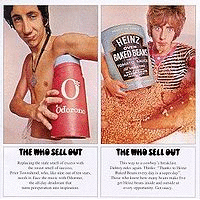Sunday, May 30, 2010
April Young
Thursday, May 27, 2010
The Who - ...Sells Out, Tommy, Who's Next
 The Who Sells Out Release Date:
The Who Sells Out Release Date:Who Fan: "You like the Who?"
Wednesday, May 19, 2010
Wilco - Yankee Hotel Foxtrot
 Release Date: April 23, 2002
Release Date: April 23, 2002★★★★★ Tracks:
Kamera
War on War
Jesus, etc.
Ashes of American Flags
"Radio Cure:"
"Oh, distance has no way of making love understandable"
"Ashes of American Flags:"
"I'm down on my hands and knees
Every time the doorbell rings
I shake like a toothache
When I hear myself sing
All my lies are only wishes
I know I would die if I could come back new"
"Poor Places"
"There's bourbon on the breath
Of the singer you love so much
He takes all his words from the books
That you don't read anyway"
"Jesus, etc."
"I'll be around
You were right about the stars
Each one is a setting sun
Tall buildings shake
Voices escape singing sad, sad songs
Tuned to chords
Strung down your cheek
Bitter melodies
Turning your orbit around"
Thursday, May 13, 2010
Wilco - Summerteeth

★★★★★ Tracks:
Can't Stand It
A Shot in the Arm
How to Fight Loneliness
(Note: the live version doesn't include all the bells and whistles that the album song features. But the energy from the performance here makes it the best clip available. For the studio version, click here.)
Thursday, May 6, 2010
Wilco - Being There

★★★★★ Tracks:
Sunken Treasure
My introduction to Wilco was through Yankee Hotel Foxtrot, and it's become one of those rare records that never gets old. Being as I liked it so much, I did what I always do when discovering new artists and worked my way backwards, downloading both Being There and Summerteeth. I never got around to listening to much of either one of them until now, but Being There, a double-album spanning 19 songs, is just not keeping my interest like YHF did.
I think Wilco's second album would be considered Americana. I don't really even know what that means, but according to Wikipedia, "Americana is popularly referred to, especially in print, as alternative country, alt-country or sometimes alt.country." And I think that's a pretty good fit. This is Good ol' Country-pop for the kids. Country was never my thing, but I can still listen to and enjoy an album from the genre should it include some catchy tunes and a touch of originality. Being There has a bit of both, but most of these tracks sound more like homages to their influences. "Far, Far Away," "Forget the Flowers," and "Why Would You Wanna Live?" are all nice acoustic, bluesy-country songs, with steel guitar, and the occasional banjo added for good measure. But the big-sounding, electric rock'n'roll songs like "Monday," "Outtasite," and especially "I Got You," with it's anthemed vocals, "I got you and it's all I need!" are just downright corny. If I'm ever in the mood for country rock, I'll most likely stick to my Neil Young and Bob Dylan records. I could do without Being There.
I did find one gem however, fittingly entitled "Sunken Treasure." A great line is repeated throughout the song, and Wilco adds a touch of experimentalism -- untuned guitars, out-of-key chords, and trippy vocal effects -- that helps to compliment the subject matter.
"I am so out of tune.
With you."
